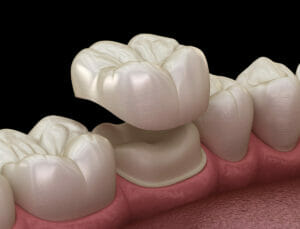Maintaining a healthy mouth and confident smile can be challenging at times, and you may need the help of a dental solution. One of the most common of these solutions is the dental crown. With it, you can protect or replace a natural tooth and still keep your smile and eating ability intact. In other words, the dental crown is the go-to solution for a variety of issues you may experience over your lifetime.
What Exactly are Dental Crowns?
Dental crowns are a restorative treatment for patients who have a decayed or damaged tooth. Essentially, they are artificial caps that sit atop what remains of natural teeth or attach to dental implant posts.
These crowns excel as a dental solution because they can safeguard natural teeth from ongoing damage, restore teeth’s normal functions, and improve or enhance your smile. They can also support a dental bridge or dentures.
5 Things to Know About Dental Crowns
While you may do everything you can, including brushing and flossing daily, circumstances can often give way to the need for a dental crown. Here are five essential things to know about this dental solution.
1. A Dental Crown Looks and Functions Like a Natural Tooth
Dental crowns restore the form, function, and look of a natural tooth. With it, you can continue to eat, talk, and laugh normally. They can also help you regain confidence in your smile by no longer worrying about staining, cracks, or other deformities showing.
Along with looking and functioning like a normal tooth, a dental crown also requires the same level of oral hygiene, including brushing and flossing daily. The last thing you want is for decay to develop below or around the tooth and cause problems, including progressive gum disease.
2. There are Different Types of Crowns
Different types of crowns exist, consisting of various materials, and each comes with its own pros and cons. These materials include porcelain, metal, porcelain-fused to metal, ceramic, and resin.
- Porcelain: Porcelain crowns provide a natural look, with colors matching as close as possible to your natural teeth. They are, however, prone to chipping if you’re not careful.
- Metal: Metal crowns are highly durable, being able to withstand the pressure that occurs during chewing and biting down, and are best for replacing molars that remain out of sight when you smile.
- Porcelain-fused to metal: These crowns offer an aesthetically pleasing look, with the ability to match the color of surrounding teeth, but are somewhat less durable than other types of crowns.
- Ceramic: Like porcelain, ceramic crowns provide a natural look, with colors matching as close as possible to your natural teeth. The cons include a higher risk of chipping or cracking.
- Resin: Resin crowns are an affordable option yet can wear down quicker and are at risk for pressure fractures.
3. You Can Choose Between Traditional or CEREC Crowns
Today patients have more options when it comes to crown selection. You may want or need to go with the traditional crowns or be a good candidate for the one-visit procedure for CEREC® crowns.
Traditional crowns will require more than one visit to complete. Once your dentist determines if a crown is a good option for you with an exam, digital impressions will be taken. Next, your dentist will numb the area of the tooth and remove the parts with decay, cracks, and any failing fillings.
What remains of the tooth will then undergo shaping, followed by an impression to send to the dental lab for creation of your new crown. Placement of a temporary one occurs prior to leaving the dental office, and you will need to return once the custom-created crown is ready.
CERAC dental crowns usually require just one visit to complete. A digital scan of the tooth and adjacent teeth starts the process. As you wait, the creation of the new crown occurs via 3-D technology. Once completed, your dentist will adjust the fit and cement the CERAC crown in place.
4. Dental Crowns are Also Used in Cosmetic Dentistry
While dental crowns are a viable restorative solution for damaged or missing teeth, they also can be cosmetic dentistry options for patients.
Dental crowns can serve to reshape a tooth to better match the adjacent teeth or replace one that is chipped or worn down. Crowns can also be a solution for excessive staining or discoloration of teeth which affects your smile and your self-confidence.
5. Dental Crowns Can Last for Years
Most dental crowns can last up to 10 or even 15 years. Much will depend on the location of the crown inside your mouth. For instance, if the crown is in the back sections of the mouth, where some of the toughest chewing occurs, it can wear down faster and need replacing sooner than if it were placed in the front.
Another factor contributing to how long your crown will last is whether or not you practice good oral hygiene habits. Patients who brush at least twice daily, floss, and schedule regular dental cleanings and exams can extend the life of a crown.
Other ways to increase the lifespan of a dental crown and slow the wearing down, chipping, or cracking include:
- avoid chewing on or biting down on hard items, such as nuts, ice, or candy,
- limit chewy and sticky foods, such as gum and caramels
- stop using teeth as a tool such as to open a package or bottle
Contact Stiles Dental Care to Learn More About the Value of Dental Crowns
When it comes to your oral health and enchanting smile, knowing what restoration or cosmetic options are available to you is crucial. Dr. Stiles and his team will answer your questions, address your concerns, and offer recommendations to assist you in making the right decisions for your dental care, including how to benefit from dental crowns. Contact our office today to learn more and schedule an appointment.

